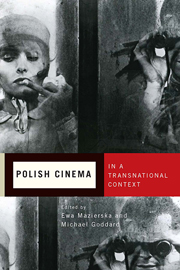Book contents
- Frontmatter
- Contents
- Acknowledgments
- Introduction: Polish Cinema beyond Polish Borders
- Part One The International Reception of Polish Films
- Part Two Polish International Coproductions and Presence in Foreign Films
- Part Three Émigré and Subversive Polish Directors
- Selected Bibliography
- List of Contributors
- Index
Introduction: Polish Cinema beyond Polish Borders
Published online by Cambridge University Press: 05 April 2014
- Frontmatter
- Contents
- Acknowledgments
- Introduction: Polish Cinema beyond Polish Borders
- Part One The International Reception of Polish Films
- Part Two Polish International Coproductions and Presence in Foreign Films
- Part Three Émigré and Subversive Polish Directors
- Selected Bibliography
- List of Contributors
- Index
Summary
The idea for this book originated in our observation that while there is a growing body of innovative work dealing with transnationality in world cinema, studies devoted to this phenomenon tend to omit Eastern European cinemas, including Polish films, which is an area of special interest to the editors of this volume. For example, Elizabeth Ezra and Terry Rowden's Transnational Cinema does not include even one chapter devoted to films or filmmakers from Eastern Europe. They are also typically omitted from the studies of “world cinema.” Similarly, histories of Polish cinema, whether written by Polish film historians working in Poland, Polish émigré authors, or non-Polish authors, tend to ignore transnational phenomena or do not account for the differences between films made within Polish borders and those made elsewhere in the world. Arguably Paul Coates's consideration in The Red and the White of the “temporary exile” of filmmakers like Andrzej Wajda and Krzysztof Zanussi, and of the more permanent exilic condition of filmmakers like Jerzy Skolimowski and Agnieszka Holland, is an exception to this rule. However, at best this is only a start; ultimately, time will tell whether the “prolonged absence” of these directors from the national cinema scene “may sap the will and—more importantly—the ability to speak for one's countrymen.” Despite the promise of a consideration of Polish cinema post-1989—that is, “the question of co-production”—such consideration is only a preamble to the main focus of the chapter on the cinema of Krzysztof Kieślowski. But even here, the transnational dimensions of his work are deempahsized, authorized by a reading in terms of Kieślowski's supposed “demotion of politics.” Ultimately, this points to the need to expand the consideration of transnationality, coproduction, and exile beyond the limits of their current articulations in relation to Polish cinema.
- Type
- Chapter
- Information
- Polish Cinema in a Transnational Context , pp. 1 - 20Publisher: Boydell & BrewerPrint publication year: 2014

